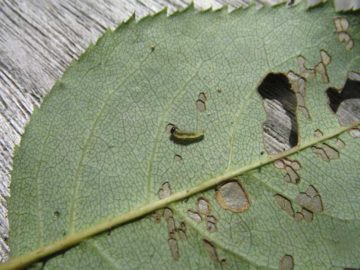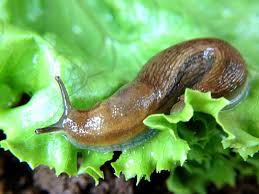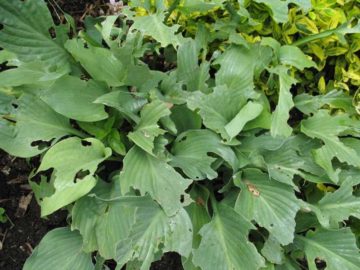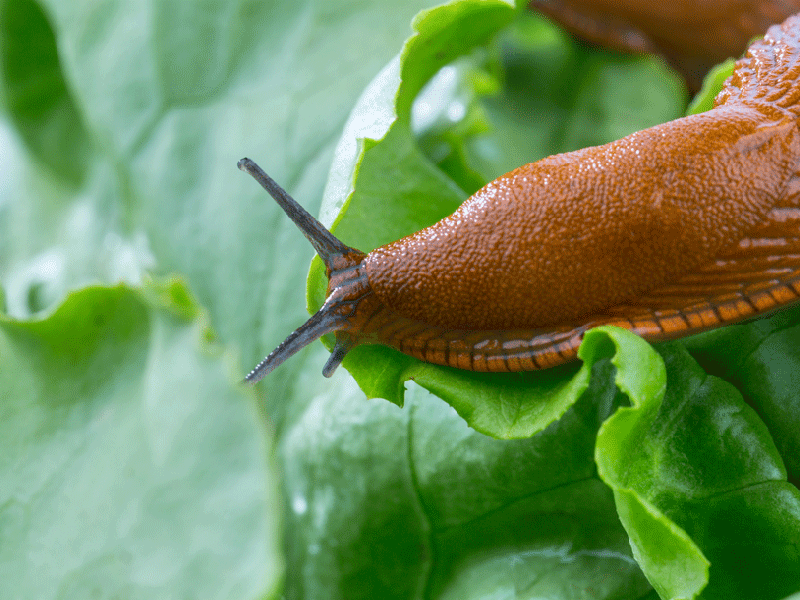Slugs are among the most easily recognized pests and if you have slugs in your garden, you are probably familiar with the damage they cause to your plants. You may notice their slimy trail they leave behind or the shredded leaves of your plant.
Slugs are nocturnal, so you don’t generally see them. They will emerge or hatch in the spring when the temperatures begin to warm. Slugs prefer cool, moist surroundings, so consequently they come out to feed at night and spend the day resting beneath logs, stones, leaves and plant debris or anywhere else that helps them retain their body moisture so they don’t dry out. If slugs are present in your gardens you will start noticing small holes or shredded leaves, and soon the plant becomes completely unsightly. 
Your first line of defense is to clean the debris from your garden, cutting off the old leaves on spent plants immediately after the frost in the fall. If you didn’t do that last fall, now would be the time to get it done before those eggs hatch. While you are cleaning up the old leaves, take a small garden trowel, and disturb the earth around the base of the plants to dislodge any eggs that may be hiding there.
The adults can live up to three years, wintering over in fallen plant debris. They feed on many kinds of plants grown in the garden, be it a flower garden or a vegetable garden. They especially like strawberries and hostas. This should come as no surprise as these plants offer the cover and moist environment that slugs prefer. While it is nearly impossible to eliminate slugs entirely, it is possible to control them and the damage they inflict. The easiest control measure is to make sure there is nowhere for them to take shelter during the day. Clean up any garden debris, organic material, leaves, wood, etc. that will afford shelter. Remove any unneeded flat stones or bricks and boards from the garden area if possible. Make sure compost piles and sites for waste materials are at a distance from the garden. When mulching, apply no more than 3 inches of mulch. This will retain enough moisture for the plants but dry sufficiently to dissuade slugs from hiding in it.
 There are chemical products on the market that will control slugs and snails. Unless you have a serious infestation, organic measures are much cheaper and can be just as effective. If there are only occasional individuals, these can simply be picked off the plant. For some reason slugs are especially drawn to beer and other yeast containing liquids. One way to trap them is to lay out an aluminum pie plate filled with beer close to the plants that are being damaged by the slugs.
There are chemical products on the market that will control slugs and snails. Unless you have a serious infestation, organic measures are much cheaper and can be just as effective. If there are only occasional individuals, these can simply be picked off the plant. For some reason slugs are especially drawn to beer and other yeast containing liquids. One way to trap them is to lay out an aluminum pie plate filled with beer close to the plants that are being damaged by the slugs.
Iron Phosphate is an organic product, (*Slug B Gone) and is safe for children, pets, fish, and even earthworms. You don’t have to apply it after every rain, like you do the other remedies. In fact, you only need to use it three times a year. When it does break down, it becomes fertilizer for your soil. In the autumn, after you clean up the garden debris, sprinkle the iron phosphate product on the damp soil of your garden, hopefully killing most of the adults. Then, in the spring, do another application, followed by a third, one month later. That should take care of most of the young ones who escaped the early spring application, cutting down on the amount of live slugs that will do damage to your plants.
Slugs are food for many creatures normally found in our gardens: ants, some beetles and their grubs, earwigs, garter snakes, toads and turtles. So don’t be in too much of a hurry to completely eliminate these friendly species from your yard.
If all else fails, you can always choose plants slugs do not like. Instead of soft-leaved, juicy plants like lettuce, hostas, marigolds, strawberries and many vegetables, substitute fuchsias, geraniums, impatiens, and lavender as these are resistant to slug damage. Slugs will also avoid fragrant herbs with stiff leaves such as rosemary and thyme as well as grasses and many ornamental plants.

